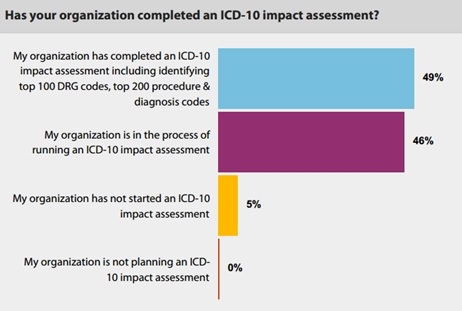75% of healthcare organizations have not yet begun ICD-10 testing, but also expect testing to take between 11-16 months, according to recent survey by QualiTest. Conducted during June 2013, the survey included over 300 senior level IT, revenue management, and medical coding professionals that have described themselves as “directly involved with ICD-10 remediation efforts.”
The majority of respondents have either completed their ICD-10 assessment or are currently in the process of running it. The findings indicated they were comfortable with their testing abilities to verify their technology stack and their internal coder readiness but indicated concern with the ability of testing to cover functional integration with key trade partners and revenue impact testing.

Other key findings include:
- 61% of healthcare organizations are planning thorough revenue impact testing with our trading partners for the ICD-10 transition.
- Those planning to use GEMs or cross-walks for generating test data were most worried about incorrect mapping or the high cost of such tools (combined, about 80% of respondents).
- 38% say their healthcare organization is focused on ICD-10 testing more than on clinical documentation improvements (CDI)
- Most organization are either planning to code their own data, or do not know how they will source the data they will use in their database (with the third most popular item being acquiring a tailored database).
- Half the organizations are planning on coding their own data, but know that the main problem with this is incorrect coding and the availability of the coded test data, which both would delay the testing effort.
- 85% planning dual coding in both ICD-9 and ICD-10 before October 2014.
- Concerning acquiring a tailored database of dual-coded medical records, 44% feared the additional costs of attaining such a system (though they recognized the benefit of doing so), with 32% concerned with the accuracy of the in-house coders who will be using the system.
- 33% of respondents are planning to test with up to 5 payers
For the complete survey results, click here
